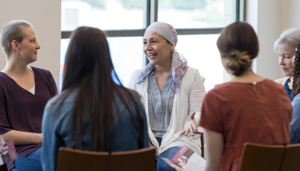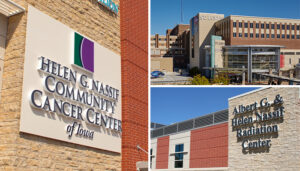Clinical Trials At Nassif Community Cancer Center Help Pave The Way For The Future
Clinical trials play an important role in the fight against cancer. They can lead to new ways to prevent disease, detect cancer sooner, reduce side effects for better quality of life and improve outcomes.
“That’s how we advance,” says Kristin Sperfslage, regulatory and study coordinator for Nassif Community Cancer Center. “The standard of care our patients receive today was developed through clinical trials. The therapies we’re testing now may benefit others tomorrow.”
Together with Physicians’ Clinic of Iowa Hematology & Oncology, Nassif Community Cancer Center and St. Luke’s Nassif Radiation Center are part of the Iowa Wide Oncology Research Coalition (I-WORC). We participate in federally funded clinical trials through the National Cancer Institute, as well as trials conducted by industry or pharmaceutical companies, giving patients the opportunity to be part of advanced clinical trials right here at home.
Sperfslage and Samantha Simpson, regulatory and study coordinator for Nassif Community Cancer Center, work closely with patients from initial screening through followup.
“We screen every patient who walks through our door so we can offer all possible options,” explains Simpson. “Even if there’s not a trial that’s right for you now, cancer care is always evolving and there may be something in the future.”
Patients benefit in many ways from research taking place at the Nassif Community Cancer Center. In some cases they have access to treatment not generally available for their type of cancer. “It may be a new therapy their insurance won’t cover, but we can get it for them through a clinical trial,” says Sperfslage.
The research department also helps physicians stay on top of the latest advances in cancer treatment. “Our doctors are always looking for the best therapies,” notes Simpson, “so they can provide the highest level of care for our patients.”
Of course patient safety is paramount when it comes to clinical trials. The research coordinators explain the process thoroughly and have patients review the consent form at home so they can be confident they are making the right decision.
There are currently 25 to 30 active trials underway through the Center, from testing a drug to see if it can prevent a recurrence of breast cancer, to a symptom-management trial evaluating the effectiveness of acupuncture in relieving dry mouth for head and neck cancer survivors.
And there may be last-line therapy trials available for patients for whom standard treatments have failed.
“Patients who participate in these trials feel good about their role,” adds Simpson. “It gives them hope, and they’re proud to know they’re helping future generations, too.”







